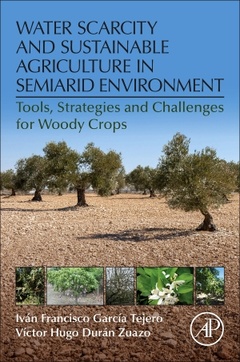Description
Water Scarcity and Sustainable Agriculture in Semiarid Environment
Tools, Strategies, and Challenges for Woody Crops
Coordinators: Garcia Tejero Ivan Francisco, Duran Zuazo Victor Hugo
Language: English
Subjects for Water Scarcity and Sustainable Agriculture in Semiarid...:
Keywords
Acclimation; Adaptation measures; Adaptation strategies; Agriculture; Alternate bearing; Avocado (Persea americana Mill.)Deficit irrigation; Blue; Chlorophyll fluorescence; Climate change; Clonal selection; Consumer preferences; Crop phenology; Crop water applied; Crop water requirements; Cuticle biosynthesis; Cuticle composition; Cuticle ultrastructure; Cuticle; Cutin; Deficit irrigation; Diospyros species; Drought tolerance; Drought; Energy efficiency; Fatty acids; Fruit biochemistry; Fruit co
Support: Print on demand
Description
/li>Contents
/li>Readership
/li>Biography
/li>Comment
/li>
Water Scarcity and Sustainable Agriculture in Semiarid Environment: Tools, Strategies and Challenges for Woody Crops explores the complex relationship between water scarcity and climate change, agricultural water-use efficiency, crop-water stress management and modeling water scarcity in woody crops. Understanding these cause- and effect relationships and identifying the most appropriate responses are critical for sustainable crop production. The book focuses on Mediterranean environments to explain how to determine the most appropriate strategy and implement an effective plan; however, core concepts are translational to other regions. Informative for those working in agricultural water management, irrigation and drainage, crop physiology and sustainable agriculture.
Section 1: Water Scarcity - Climate Change and Environmental Challenges 1. Water Management and Climate Change in Semiarid Environments 2. Water-Energy Nexus in Irrigated Areas. Lessons from Real Case Studies 3. Water Footprint Accounting for Improving Irrigation Management in Olive Trees 4. Local and Collective Actions for Adaptation to Use Less Water for Agriculture in the Mediterranean Region
Section 2: Crop Water Stress Management and Water Use Efficiency Under Drought Conditions 5. Agronomical Effects of Deficit Irrigation in Apricot, Peach, and Plum Trees 6. Deficit Irrigation Management in Early-Maturing Peach Crop 7. Long-Term Physiological and Agronomic Responses of Citrus Irrigated With Saline Reclaimed Water 8. Persimmon (Diospyros kaki) Trees Responses to Restrictions in Water Amount and Quality 9. Precision Irrigation in Olive (Olea europaea L.) Tree Orchards 10. Water and Heat Fluxes in Mediterranean Vineyards: Indicators and Relevance for Management 11. Irrigation of Pistachios: Strategies to Confront Water Scarcity 12. Sustainable Deficit-Irrigation Management in Almonds (Prunus dulcis L.): Different Strategies to Assess the Crop Water Status 13. Irrigation Strategies for Mango (Mangifera indica L.) Under Water-Scarcity Scenario in the Mediterranean Subtropical Environment 14. Avocado (Persea americana Mill.) Trends in Water-Saving Strategies and Production Potential in a Mediterranean Climate, the Study Case of SE Spain: A Review
Section 3: Physiological and Molecular Responses to Drought 15. Fruit Response to Water-Scarcity Scenarios. Water Relations and Biochemical Changes 16. Genetic Improvement of Grapevine (Vitis vinifera L.) Water Use Efficiency: Variability Among Varieties and Clones 17. Mesophyll Conductance to CO2 Diffusion: Effects of Drought and Opportunities for Improvement~ 18. The Olive Tree Under Water Stress: Fitting the Pieces of Response Mechanisms in the Crop Performance Puzzle 19. Environmental Factors Controlling Carbon Assimilation, Growth, and Yield of Papaya (Carica papaya L.) Under Water- Scarcity Scenarios 20. Fleshy Fruit Epidermis is a Protective Barrier Under Water Stress
Researchers, universities, policy makers, technicians, stakeholders, PhD students, and research institutions in agricultural water management, irrigation and drainage, crop physiology, and sustainable agriculture
Víctor Hugo Durán Zuazo has participated as coordinator in research projects in the area of natural resources at regional, national and EU level. He is the head of the Conservation and Sustainable Use of Soil, Water & Biodiversity in Agricultural Systems CUSABA (AGR-144). He deals with land- and water-management interventions in Mediterranean agroforestry systems, with the aim of preventing, reducing or recovering losses of soil, water, and biodiversity. In terms of knowledge and research, the focus is on sustainable land management, specifically: land-degradation processes; conservation measures and interventions at both field and watershed scale; and the harmony of sustainable management practices that encourage productivity, climate-change mitigation, soil quality, and water-use efficiency. Agricultural Engineering at National Agricultural University Ukraine, 1993; Doctor, University of Almeria Spain, 2001; Post-doc researcher at Wagen
- Focuses on semi-arid crops including olive, vine, citrus, almonds, peach, nectarine, plum, subtropical fruits and others
- Explores crop physiological responses to drought at plant, cellular and/or molecular levels
- Presents tool options for assessing crop-water status and irrigation scheduling




